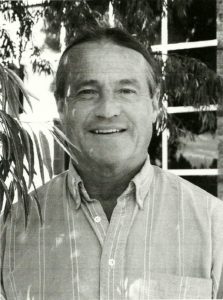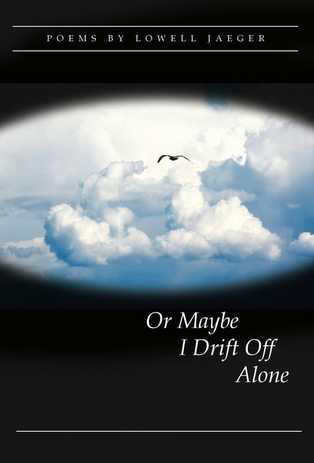
Flathead Valley poet and educator Lowell Jaeger took his seat this summer as Montana’s seventh Poet Laureate. He reads from his work at 4:30 p.m. Saturday at the Downtown Dance Collective during the Montana Book Festival.
Jaeger succeeds Livingston poet Michael Earl Craig.
“I am delighted that Lowell Jaeger has been awarded this distinction,” says Jean Steele, Montana Arts Council member and chair of the Poet Laureate committee. “I find his imagery deft, and I’ve long admired his blending of commonplace moments with the wonder and splendor of experience.”
Jaeger is a nationally recognized poet. For the past 30 years, he has delighted diverse Montana audiences with readings, lectures, discussions, radio shows, and poetry workshops.
Since 1984 he has served as professor of English/creative writing at Flathead Valley Community College in Kalispell, where he coaches a wide variety of students in the art of writing poems. During this time, he has also served on an impressive array of arts and humanities initiatives, working with Montana school districts, the Glacier Institute, Elderhostel, the Montana Arts Council, Humanities Montana, the American Library Association, National Endowment to the Arts, and National Endowment to the Humanities.
He lives in Yellow Bay with wife, Amy, and their children, Bettreena, Jesseamyn, and Aamon.
Small things made eloquent

Lowell Jaeger’s seventh collection of poems, Or Maybe I Drift Off Alone, was published this year by Shabda Press (Pasadena, CA).
“This is a book of small things and lessons made eloquent by Jaeger’s formal and lyrical skill,” writes former Montana Poet Laureate Tami Haaland. “County library book sales, small town restaurants, road trips, and tow trucks all have a place in this volume whose ultimate theme is acceptance, forgiveness and love.”
Poet Christopher Buckley (editor of Miramar Poetry Magazine) says Jaeger’s poetry “reminds us gently, but with a moral and humane undercurrent, to put by ‘all this/important nonsense’ and appreciate the small details of our lives, to see them transformed as he does. Lowell Jaeger writes with a craft, clarity, and subtle intensity that has ‘my battered earth/singing in tongues.'”
His first collection, War On War, published in 1988, was nominated for the Los Angeles Times Book Award.
Jaeger won the National Looking Glass Poetry Award in 1984, which resulted in the publication of his first chapbook of poems, Native Land, from Pudding House Press. Pudding House has since published five other chapbooks by Jaeger: Black Ice, Star-Crossed, The Banana Man, Nobody Special, and Lowell Jaeger: Greatest Hits.
In the past 10 years alone, Lowell has published more than 300 poems in academic and nonacademic journals across the United States such as Poetry, Iowa Review, The Atlanta Review, Prairie Schooner, Connecticut Review, Poetry East, North American Review, and others. His poems are well known for their insightful honesty, relevance to ordinary lives, and accessibility to readers.
In 2005, Jaeger founded Many Voices Press, a nonprofit literary press, specializing in poetry by Montana poets and poems in Native American languages. MVP first published Poems Across the Big Sky, an anthology of 120 Montana poets, including 12 Native American poets and poems in four Native American languages: Salish, Assiniboine, Cheyenne, and Dakota.
Publication of this anthology generated sales of more than 2,000 copies within six months. The new edition, Poems Across the Big Sky II, was released this spring and includes poets from the first anthology, as well as “a promising crew of new poets, including Native American writers and several talented high school students.”
“With this second Montana anthology, we are casting our dreams forward to decades and decades hence,” writes Jaeger in the introduction. “Let’s make this a Montana tradition.”
The press has also published works by three Native American writers. Good Enough, a collection of poems by Salish elder Victor A. Charlo, was published in the fall of 2008, and Jaeger and Charlo have read and presented together at various events since then, including book-launch celebrations on the University of Montana and Salish Kootenai College campuses.
Our Blood Remembers, a collection of poems by Dakota/Lakota poet Lois Red Elk was published in 2011, and won the Native Writers Circle Award; Many Voices also published her second collection, Why I Return to Makoce in 2015. Nakoda Sky People, a collection of poems by Assiniboine poet Minerva Allen was published in 2012.
Red Elk describes Jaeger as a “consummate professional in the area of editing, writing and publishing. He also showed a great respect and sensitivity toward the cultural differences among us three Native writers.
“Mr. Jaeger has a keen sense of knowing how to spot the best of a writer and understands the best practices of preserving diverse cultural traditions in general,” she writes. “It is always a pleasure to work with an editor who is pleasant and shows a positive attitude. That makes writing fun and more interesting.”
Jaeger’s New Poets Anthologies
New Poets of the American West, released in 2010, is an anthology of poets from 11 western states. Jaeger’s intention with this project was to introduce relatively unknown poets in the company of respected veterans. The anthology also features poems in Native American languages and Spanish.
Publication celebrations/readings for New Poets of the American West were held in 32 different locations in 11 western states and the anthology was nominated for the High Plains Book Award.
Connie Hitchcock, director of Humanities, Social Sciences and Business at FVCC, writes in her nomination letter:
“Lowell brings to the world a unique inquisitiveness that he chooses to share through his poetry. His students leave his class certainly as better writers, better poets, but more importantly as better human beings. He teaches, no demonstrates, the value of critical thinking, of exploration, of respecting diversity, and of speaking one’s own truth.
“For a poet, a writer of any genre, this would seem to be a noble road to follow. And what better representation of the essence of Montana – to speak one’s own truth?”
Flathead Valley poet and educator Lowell Jaeger took his seat this summer as Montana’s seventh Poet Laureate. He succeeds Livingston poet Michael Earl Craig.
“I am delighted that Lowell Jaeger has been awarded this distinction,” says Jean Steele, Montana Arts Council member and chair of the Poet Laureate committee. “I find his imagery deft, and I’ve long admired his blending of commonplace moments with the wonder and splendor of experience.”
Jaeger is a nationally recognized poet. For the past 30 years, he has delighted diverse Montana audiences with readings, lectures, discussions, radio shows, and poetry workshops.
Since 1984 he has served as professor of English/creative writing at Flathead Valley Community College in Kalispell, where he coaches a wide variety of students in the art of writing poems. During this time, he has also served on an impressive array of arts and humanities initiatives, working with Montana school districts, the Glacier Institute, Elderhostel, the Montana Arts Council, Humanities Montana, the American Library Association, National Endowment to the Arts, and National Endowment to the Humanities.
He lives in Yellow Bay with wife, Amy, and their children, Bettreena, Jesseamyn, and Aamon.
Small things made eloquent
Lowell Jaeger’s seventh collection of poems, Or Maybe I Drift Off Alone, was published this year by Shabda Press (Pasadena, CA).
“This is a book of small things and lessons made eloquent by Jaeger’s formal and lyrical skill,” writes former Montana Poet Laureate Tami Haaland. “County library book sales, small town restaurants, road trips, and tow trucks all have a place in this volume whose ultimate theme is acceptance, forgiveness and love.”
Poet Christopher Buckley (editor of Miramar Poetry Magazine) says Jaeger’s poetry “reminds us gently, but with a moral and humane undercurrent, to put by ‘all this/important nonsense’ and appreciate the small details of our lives, to see them transformed as he does. Lowell Jaeger writes with a craft, clarity, and subtle intensity that has ‘my battered earth/singing in tongues.'”
His first collection, War On War, published in 1988, was nominated for the Los Angeles Times Book Award.
Jaeger won the National Looking Glass Poetry Award in 1984, which resulted in the publication of his first chapbook of poems, Native Land, from Pudding House Press. Pudding House has since published five other chapbooks by Jaeger: Black Ice, Star-Crossed, The Banana Man, Nobody Special, and Lowell Jaeger: Greatest Hits.
In the past 10 years alone, Lowell has published more than 300 poems in academic and nonacademic journals across the United States such as Poetry, Iowa Review, The Atlanta Review, Prairie Schooner, Connecticut Review, Poetry East, North American Review, and others. His poems are well known for their insightful honesty, relevance to ordinary lives, and accessibility to readers.
Many Voices Press: Publishing new voices
In 2005, Jaeger founded Many Voices Press, a nonprofit literary press, specializing in poetry by Montana poets and poems in Native American languages. MVP first published Poems Across the Big Sky, an anthology of 120 Montana poets, including 12 Native American poets and poems in four Native American languages: Salish, Assiniboine, Cheyenne, and Dakota.
Publication of this anthology generated sales of more than 2,000 copies within six months. The new edition, Poems Across the Big Sky II, was released this spring and includes poets from the first anthology, as well as “a promising crew of new poets, including Native American writers and several talented high school students.”
“With this second Montana anthology, we are casting our dreams forward to decades and decades hence,” writes Jaeger in the introduction. “Let’s make this a Montana tradition.”
The press has also published works by three Native American writers. Good Enough, a collection of poems by Salish elder Victor A. Charlo, was published in the fall of 2008, and Jaeger and Charlo have read and presented together at various events since then, including book-launch celebrations on the University of Montana and Salish Kootenai College campuses.
Our Blood Remembers, a collection of poems by Dakota/Lakota poet Lois Red Elk was published in 2011, and won the Native Writers Circle Award; Many Voices also published her second collection, Why I Return to Makoce in 2015. Nakoda Sky People, a collection of poems by Assiniboine poet Minerva Allen was published in 2012.
Red Elk describes Jaeger as a “consummate professional in the area of editing, writing and publishing. He also showed a great respect and sensitivity toward the cultural differences among us three Native writers.
“Mr. Jaeger has a keen sense of knowing how to spot the best of a writer and understands the best practices of preserving diverse cultural traditions in general,” she writes. “It is always a pleasure to work with an editor who is pleasant and shows a positive attitude. That makes writing fun and more interesting.”
New Poets of the American West, released in 2010, is an anthology of poets from 11 western states. Jaeger’s intention with this project was to introduce relatively unknown poets in the company of respected veterans. The anthology also features poems in Native American languages and Spanish.
Publication celebrations/readings for New Poets of the American West were held in 32 different locations in 11 western states and the anthology was nominated for the High Plains Book Award.
Connie Hitchcock, director of Humanities, Social Sciences and Business at FVCC, writes in her nomination letter:
“Lowell brings to the world a unique inquisitiveness that he chooses to share through his poetry. His students leave his class certainly as better writers, better poets, but more importantly as better human beings. He teaches, no demonstrates, the value of critical thinking, of exploration, of respecting diversity, and of speaking one’s own truth.
“For a poet, a writer of any genre, this would seem to be a noble road to follow. And what better representation of the essence of Montana – to speak one’s own truth?”